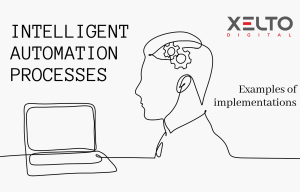𝐑𝐏𝐀 𝐨𝐩𝐩𝐨𝐫𝐭𝐮𝐧𝐢𝐭𝐢𝐞𝐬 𝐢𝐧 𝐡𝐞𝐚𝐥𝐭𝐡𝐜𝐚𝐫𝐞 – what benefits does robotization bring to staff and patients? 🤖🏥
1️⃣ 𝐈𝐦𝐩𝐫𝐨𝐯𝐞𝐝 𝐦𝐞𝐝𝐢𝐜𝐚𝐥 𝐫𝐞𝐜𝐨𝐫𝐝𝐬: RPA helps document patient encounters, diagnoses, treatments and outcomes by capturing data from electronic health records and other sources. 📝🔍
2️⃣ 𝐁𝐞𝐭𝐭𝐞𝐫 𝐩𝐚𝐭𝐢𝐞𝐧𝐭 𝐜𝐚𝐫𝐞: the most important key of robotization is patient value! RPA supports patient care by facilitating treatment coordination, case management and remote patient monitoring. RPA tracks patient progress, provides personalized recommendations and enables communication between patients and providers. It can also analyze data and identify high-risk patients who require intervention. 🏥 😷
3️⃣ 𝐒𝐭𝐫𝐞𝐚𝐦𝐥𝐢𝐧𝐞𝐝 𝐚𝐝𝐦𝐢𝐧𝐢𝐬𝐭𝐫𝐚𝐭𝐢𝐯𝐞 𝐩𝐫𝐨𝐜𝐞𝐬𝐬𝐞𝐬: RPA automates tasks such as patient scheduling, billing, claims processing, reporting and data entry. This reduces errors, saves time and frees up staff for more value-added activities. 💼⏰
EXAMPLE:
RPA can allow patients to schedule appointments online and send automatic personalized reminders, reducing missed appointments. RPA has no limits here – reminders can be in text form (email or SMS) or in the form of a voice call. Personalization is the key here, as we can address the patient by name and provide specific details about a particular appointment. 📆📲
What about data security? 🔒
RPA will handle sensitive medical data, ensuring security through encryption, anonymization and proper storage. 🛡️🔐
Healthcare systems are complex and diverse, but RPA’s solutions are able to seamlessly integrate with existing systems and handle different data formats. Automation can be tailored to meet the various regulations used in healthcare. 🔄
Discover how process robotization is revolutionizing healthcare. Discover the benefits of automation for medical personnel and patients, and how RPA is improving healthcare. Get in touch with us!







